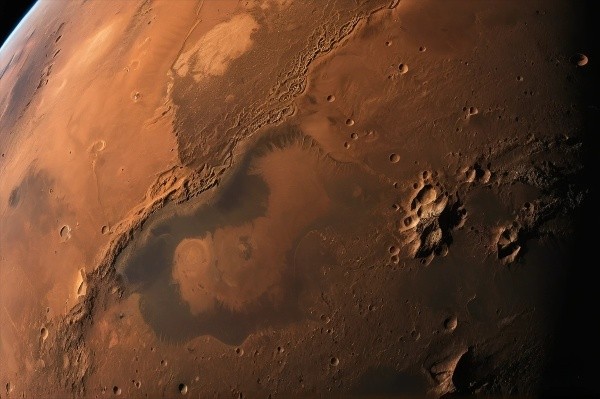Recent findings from NASA suggest that Mars may harbor a vast underground ocean, reigniting discussions about the potential for human settlement on the Red Planet. This discovery, published in the *Proceedings of the National Academy of Sciences*, indicates that a significant amount of liquid water could be trapped beneath Mars' rocky surface, possibly enough to fill a global ocean.
The Discovery of Underground Water
NASA's InSight Lander, which landed on Mars in 2018, has been instrumental in this groundbreaking research. The lander studied seismic waves from over 1,300 marsquakes before ceasing operations two years later. By analyzing data collected from Elysium Planitia, a plain near Mars' equator, researchers combined seismic readings with computer models to propose that underground water is the most plausible explanation for the seismic activity observed.
The lead scientist of the study, Vashan Wright from the Scripps Institution of Oceanography, stated that if the conditions at Elysium Planitia are representative of Mars as a whole, the underground water could potentially fill an ocean 1 to 2 kilometers deep, located between 11.5 to 20 kilometers beneath the surface. This finding is particularly significant as it builds on previous discoveries of liquid saltwater on Mars, suggesting a much larger reservoir of water than previously thought.
The Historical Context of Water on Mars
Scientists have long believed that Mars once had abundant water, possibly in the form of rivers and lakes. Recent studies, including those conducted by China's Mars rover, have indicated that water may be more widespread on the planet than earlier estimates suggested. The current understanding is that much of this water may have seeped underground billions of years ago when Mars had a more hospitable climate.
The Loss of Mars' Atmosphere
Understanding how Mars lost its atmosphere is crucial to grasping its current state. Alastair Gunn, a radio astronomer, explains that Mars once had a strong magnetic field, similar to Earth's, which protected it from cosmic radiation and solar winds. However, as Mars cooled internally, this magnetic field diminished, allowing solar winds to strip away the atmosphere, leading to the planet's cold and arid conditions.
The Future of Human Settlement on Mars
The prospect of human settlement on Mars is not merely a dream; it is becoming increasingly feasible. NASA's Perseverance Rover, launched in 2020, has successfully produced oxygen on Mars, a critical step for future human habitation. SpaceX, led by Elon Musk, has been actively working on plans to colonize Mars, envisioning a Martian city complete with habitats and infrastructure for human life.
Musk's ambitious Starship project aims to transport 200 people to Mars within six months, and the United Arab Emirates has also set its sights on establishing a human settlement by 2117. Experts believe that within the next decade or so, the idea of living on Mars may transition from science fiction to reality.
Ethical Considerations and Public Sentiment
Despite the excitement surrounding Mars colonization, ethical questions arise regarding the implications of human presence on another planet. Some argue that moving to Mars could be seen as abandoning Earth, which is already facing significant environmental challenges. A recent Pew Research Center survey revealed that only 11% of Americans prioritize Mars exploration over addressing climate change and monitoring asteroids.
Prominent climate scientists, like Katharine Hayhoe, emphasize the urgency of tackling climate issues on Earth before considering colonization of Mars. They argue that without significant action to reduce carbon emissions, the challenges facing humanity will become insurmountable long before Mars is ready for large-scale human habitation.
Conclusion
The discovery of a hidden ocean beneath Mars' surface opens up exciting possibilities for future human settlement. However, as we explore these new frontiers, it is essential to balance our ambitions with ethical considerations and a commitment to preserving our home planet. The journey to Mars may be just beginning, but the lessons learned from Earth will be crucial in shaping our approach to interplanetary exploration.








